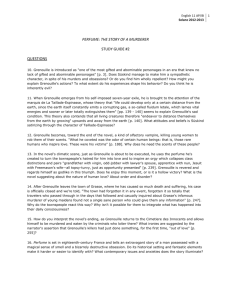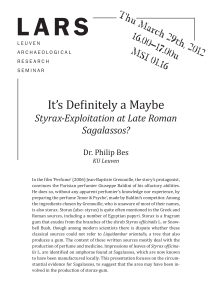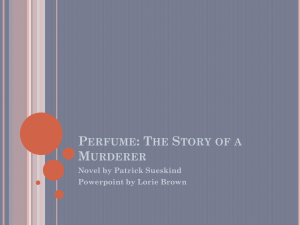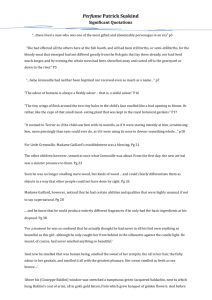Perfume: Grenouille as a Romantic Hero - Critical Analysis
advertisement
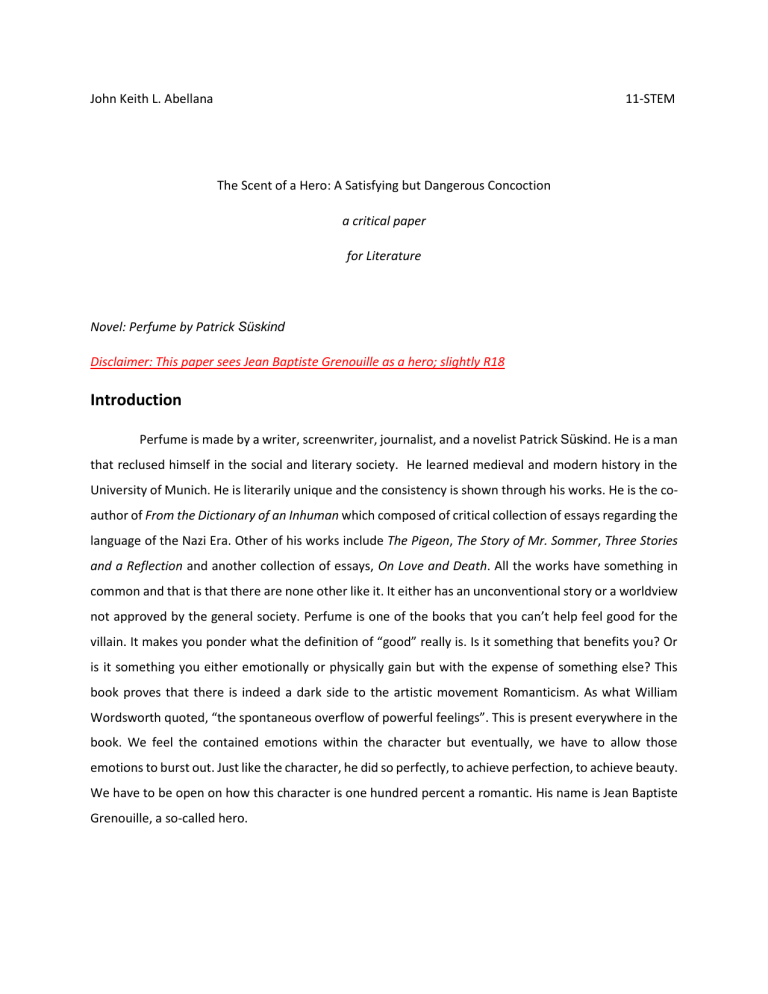
John Keith L. Abellana 11-STEM The Scent of a Hero: A Satisfying but Dangerous Concoction a critical paper for Literature Novel: Perfume by Patrick Süskind Disclaimer: This paper sees Jean Baptiste Grenouille as a hero; slightly R18 Introduction Perfume is made by a writer, screenwriter, journalist, and a novelist Patrick Süskind. He is a man that reclused himself in the social and literary society. He learned medieval and modern history in the University of Munich. He is literarily unique and the consistency is shown through his works. He is the coauthor of From the Dictionary of an Inhuman which composed of critical collection of essays regarding the language of the Nazi Era. Other of his works include The Pigeon, The Story of Mr. Sommer, Three Stories and a Reflection and another collection of essays, On Love and Death. All the works have something in common and that is that there are none other like it. It either has an unconventional story or a worldview not approved by the general society. Perfume is one of the books that you can’t help feel good for the villain. It makes you ponder what the definition of “good” really is. Is it something that benefits you? Or is it something you either emotionally or physically gain but with the expense of something else? This book proves that there is indeed a dark side to the artistic movement Romanticism. As what William Wordsworth quoted, “the spontaneous overflow of powerful feelings”. This is present everywhere in the book. We feel the contained emotions within the character but eventually, we have to allow those emotions to burst out. Just like the character, he did so perfectly, to achieve perfection, to achieve beauty. We have to be open on how this character is one hundred percent a romantic. His name is Jean Baptiste Grenouille, a so-called hero. Tragedy Equals Hero: The Past, The Present, The Future? Our hero/villain Jean Baptiste Grenouille is one amazing Romanticized hero. He is everything but nothing. He is a martyr but not a martyr. He was born without smell. This indicated a desire in his subconscious to find scents and hone it. He was born to a soon-to-be-beheaded mother and raised to an emotionally-dead caretaker and finally, sold to a child laborer for coins. The mother had been accused of infanticide and hanged without trial. The emotionally-dead caretaker had been never afraid on anyone but was afraid of Grenouille. The local tanner/child laborer had been abusing his ability that he would not complain. This is what makes him a hero, his past, but not quite. These are elements of a brave and courageous hero. His present was the journey to perfect his smell and preserve it. He had to do this with the consideration of the fact that he was not free and he would be stuck with the same perverse smells of dirty old Paris. But one night, he had smelled a beautiful and innocent smell. It had come from a girl with plums. How to drown yourself in olfactory paradise? Simply strangle and smell all the body parts of the girl. This was his first action as a hero. He had not hesitated to reach his paradise of smells. He did what was necessary. He had found a way to be mentored by the “great” dying-craft perfumer Giuseppe Baldini. Baldini taught Grenouille everything about perfume, all the foundations, the rules, and the infinite combinations of concoctions. Grenouille made better perfumes than the young perfumer Pélissier for Baldini. Naturally, Baldini would not complain, until, Grenouille had dumped the resident cat into the cauldron of boiling water. This was his second action as a hero. He took a leap of faith with the uneasiness and hope he would be closer to his goal. He had learned how to make great perfumes, but he did not know how to preserve it forever. Baldini said enfleurage was the key. He went to the Grasse, the city where it had been mastered. Before he arrived in Grasse, he was faced with a dilemma. He himself did not have a scent. It would have been a valid reason for him to so attracted to perfumes. He was lost and confused. This was his trough as a hero. In every story of Romanticism, there are peaks and troughs. This was his trough, but a trough is always overcome, and so he did. Grenouille masked himself with “human scent” and concluded the people did not “know”. This action partially proves that Grenouille did not identify himself as a human but a different being. Grenouille continued to Grasse and began a killing spree of young virgin women. Grenouille covered their bodies with odorless fat and left on the body for at least 24 hours. This odorless fat would get the scent of the women and be used to make Grenouille’s “perfume”. This was his third act as a hero. He had never looked away from his goal. Like every hero, Grenouille never faltered. Now he was an infamous criminal and a dignified hero and the police was catching up on him. Laure Richis stood out to Grenouille. All those killings were preparations for the retrieving the scent of Laure. Grenouille as a hero, had knew what his endgame would be. She was the final step in order to achieve euphoria, to achieve perfection. Grenouille as a hero, realized what his purpose of existence was. He defined his purpose himself. At the end, he was caught and trialed in the city center. About to be beheaded, he opened his creation, poured a droplet on a hanky and wooshed it around. People were in awe of him. The scent so great, everyone in the city center and the surrounding buildings had a mass orgy. This was his result. This was the end Grenouille wanted. This was the paradise. This was the end of his heroic journey; the end of his journey to perfection and utopia. As said in the book, “Grenouille knew for certain that unless he possessed this scent, his life would have no meaning”. We see from this line that the journey Grenouille had chosen, was what he thought that defined him. Romanticism at Its Finest Grenouille’s journey in every aspect is one hundred percent Romanticism. Who would have thought Grenouille would achieve what he wanted after all those situations where there was nothing for him? His past, his present, his future, were all marvelous times of a hero who started from the worst enviroments possible. The killings were only the means; nothing personal. Grenouille was not attracted to women because they were women, Grenouille was attracted because they had the scent he wanted. Grenouille had done what William Wordsworth said. The trapped sensation of yearning for his own self purpose was released wonderfully into the world and for the world to see that indeed, he is a hero. Heroes like Percy Jackson and Number Four from the I Am Number Four Series all had the pure ingredient of being defined as a started-from-the-bottom hero and as a Romanticized character. Our own Grenouille was on the verge of death right from the time he was born. From the time that the book starts, you immediately notice this obvious attribute of Romanticism. Grenouille lived a life of uneasiness. This is another attribute of Romanticism. Constantly being chased on a thin line between life and death. All Romanticized characters are pretty much the same but the distinct feature Grenouille had was that he was doing bad to do goof, for himself. With how Patrick Suskind channeled this dark side was ever so perfect. Each key detail and each point were covered without sacrificing an obvious face of Romanticism. This could’ve turn into a full-fledged thriller or mystery with so many dark and taboo actions. References: About the author:https://www.goodreads.com/author/show/39402.Patrick_S_skind About the book:https://www.goodreads.com/book/show/343.Perfume Critical analysis:https://www.penguinrandomhouse.com/books/175395/perfume-by-patricksuskind/9780375725845/readers-guide/ About Romanticism: https://en.wikipedia.org/wiki/Romanticism About Romanticism: https://www.britannica.com/art/Romanticism
